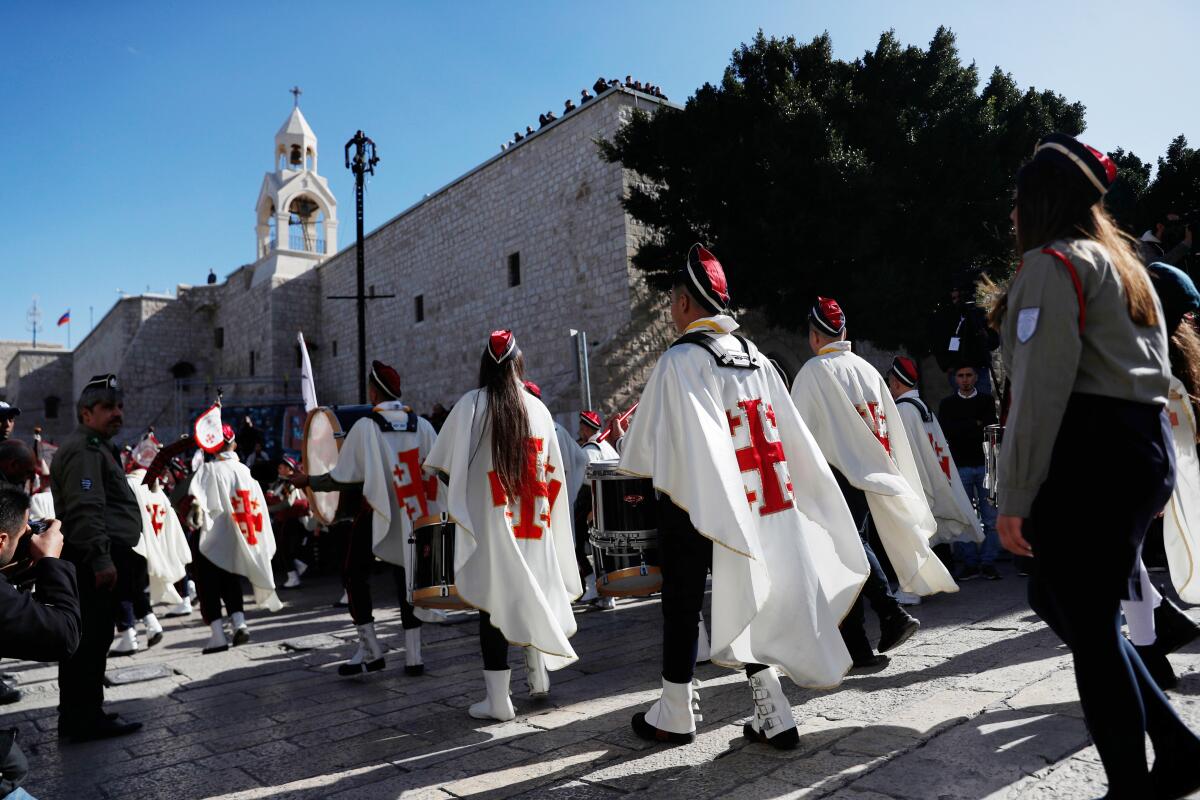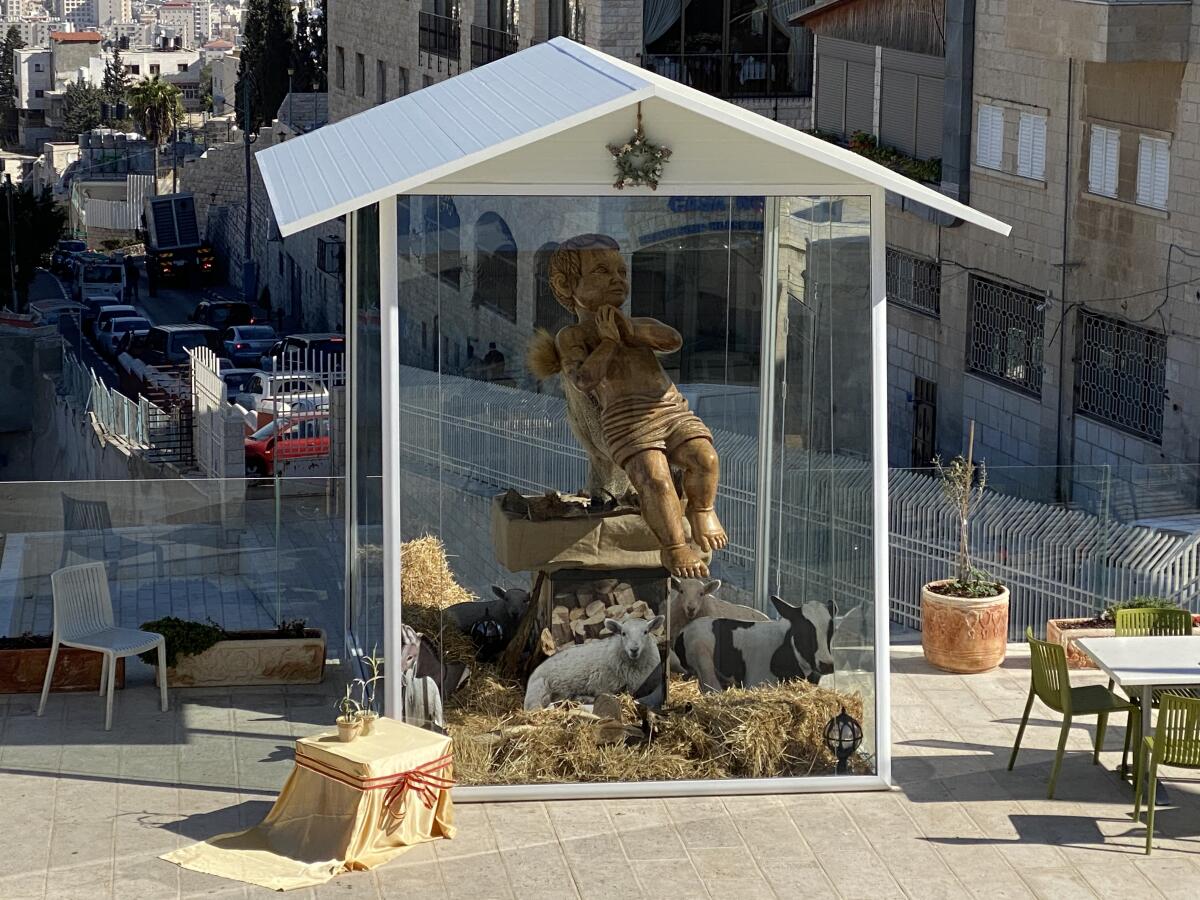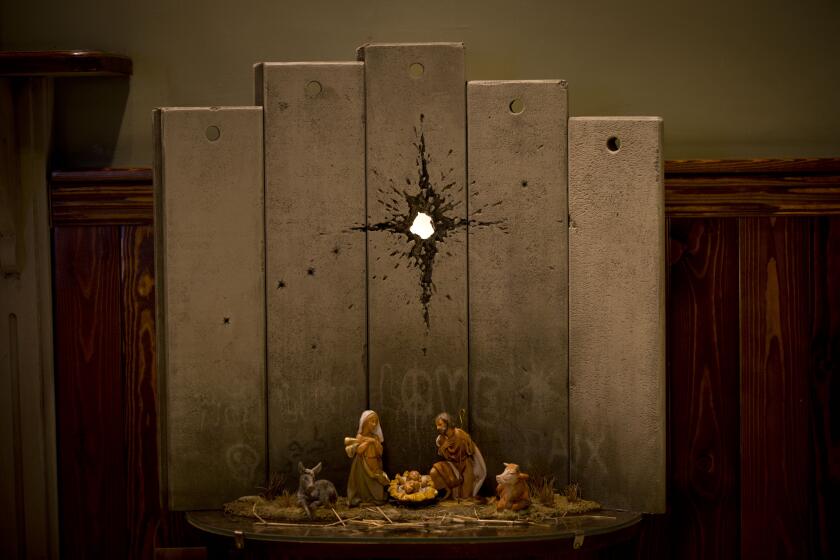Bethlehem is ready for Christmas. But one group of Christians may be kept from the holy site

BETHLEHEM, West Bank â The tree has been decorated in Manger Square, the shop fronts prettified with twinkly green and red finery. Once again, Christmas has come to Bethlehem, the little town in which Jesus is believed to have been born.
This year, a substantial number of the 1 million or more visitors who pray each year at the Church of the Nativity will be absent: Christians from the Gaza Strip, who have been denied access to Jerusalem, where Mass will be celebrated in about 80 churches, and to Bethlehem.
Or have they?
Twenty-four hours before Tuesday nightâs traditional midnight Mass, no one seemed to know.
Instead of good cheer, chaos has reigned in the days leading up to Christmas, as Israeli military authorities, who control access to and from the blockaded Gaza Strip, a tiny Palestinian seaside enclave wedged between Israel and Egypt, issued a series of contradictory edicts about a ban on travel for Gaza Christians, who are customarily granted special permits to pray at the holy sites at Christmas.
âIâve never seen anything like it,â said Archbishop Pierbattista Pizzaballa, the Latin patriarch of Jerusalem, who said he learned about the ban from news reports last week.
The mysterious street artist known as Banksy has displayed a politically charged Nativity scene in Bethlehem, the town revered as Jesusâ birthplace, just in time for the busy Christmas season.
Even during violent uprisings, he said, in his 30 years in Jerusalem he could not recall a complete prohibition on Gazans visiting Christian holy sites during the holidays.
On Dec. 11, the Israeli armyâs Coordinator of Government Activities in the Territories, or COGAT, the body responsible for Israelâs administration of occupied Palestinian territories, announced that no permits would be issued to Gaza Christians for travel to the West Bank and Jerusalem this year because of âsecurity orders.â
Two days later, the decision appeared to be confirmed by a further COGAT statement announcing that âChristian citizens in the Gaza Stripâ would be issued âpermits to go abroad via the Allenby Bridge,â which is one of Israelâs borders with Jordan, but not a gateway to Jerusalem or Bethlehem.
But then there were signs of waffling.
On Saturday, in response to a query from French Sen. Nathalie Goulet, who is a public advocate for the rights of Christians in the Middle East, the Israeli Embassy in Paris tweeted that âthere is no prohibition on Gaza Christians wishing to celebrate Christmas in Bethlehem and Jerusalem,â lauding Israelâs commitment to freedom of worship.
A flustered COGAT spokeswoman responded that she was âunawareâ of any change in policy.
Asked in a text message Saturday whether he knew of any changes, Pizzaballa, who will lead midnight Mass on Tuesday, responded wordlessly, with a meme of himself, complete with beard and robes, shrugging.
On Sunday, COGAT tweeted that it had âextended the travel facilitations for the Christian population of Gaza in recognition of the Christmas holiday,â granting entry permits for Jerusalem and for the West Bank âin accordance with security assessments and without regard to age.â
âSeveral hundredâ permits would be issued, said Shani Sasson, the COGAT spokeswoman.
On Monday, however, on the eve of Christmas Eve, Pizzaballa reported that a total of 189 permits had been issued, among them 11 for Catholics and a paltry six permits for people between the ages of 16 and 35.
âThe conduct displayed by Israeli authorities in the past weeks reflects an alarming disregard for the fundamental rights of Christian Palestinians in Gaza and the arbitrariness of decision-making when it comes to Gaza generally,â said Miriam Marmur, media coordinator for Gisha, an Israeli organization advocating for freedom of movement.
The âuncertainty, heartache and delay could have been avoided had access been granted in the first place,â she said, decrying the âpile-on of flip-flops.â
In an interview, Pizzaballa said he expected that Israel would explain its move by citing concerns that Gazans, who have lived under a blockade since the Islamic militant group Hamas took control of the territory in 2007, could use the occasion of Christmas to remain in the West Bank or Israel.
âCome on, there are no âsecurity concerns,ââ he said, rejecting the Israeli contention with a shake of his head. âNone. Zero. These are mostly old people. It is clearly a political decision.â
In previous years, Israel has issued monthlong travel permits to Christians whose identities are verified by the church, for the period spanning Catholic Christmas, on Dec. 25, and Orthodox Christmas, on Jan. 7. An estimated 800 to 1,000 Christians live in Gaza, out of a population of almost 2 million Palestinians. The vast majority of Gazans are Muslims.
Individual Gazan Christians reached by The Times refused to speak publicly about the strictures, wary of possible reprisals and, in the words of one, âstill hopeful for a Christmas miracleâ in the final hours before the holiday.

Pizzaballa returned to Jerusalem this week after a three-day weekend in Gaza, during which he performed Mass and opened a new community pharmacy and a job center for young Gazans, who enter a market with 50% unemployment.
Gaza Christians feel depressed, he said, and âanger mixed with resignationâ about their inability to pray in Jerusalem and Bethlehem this year.
COGAT, responsible for a unique hybrid of military and civilian duties, is the rare Israeli army unit that does not respond to usual military hierarchy.
Its commander, Maj. Gen. Kamil Abu Rukun, reports directly to the defense minister, leapfrogging over the army general staff.
Defense Minister Naftali Bennett, a right-wing rival of Prime Minister Benjamin Netanyahu, was appointed to the post last month, in the midst of political turmoil in Israel.
Netanyahu is running for reelection after having failed twice in the last year to form a coalition government. Complicating his electoral prospects, in November he was indicted on several corruption charges, including bribery, fraud and breach of trust.
Bennett leads the hard-line New Right party, which champions the rights of Jewish settlers in the West Bank and advocates Israelâs annexation of part of the occupied territory. In a message exchange with The Times, Bennett said he would not comment on whether there were travel restrictions.
He is a crucial figure in any future political union Netanyahu may establish, if reelected, and has positioned himself as a less compromising figure than the prime minister. This month, after southern Israeli communities were pelted by rockets launched by Islamist militias in Gaza, Bennett said that Israel would pivot from âa defensive approach to an attacking approach.â
âWhatever weâll do,â he said, âweâll do it at the right time, in the right way and with great force. No one will drag us to it. A good ruse is served cold, not when the blood is boiling and the other side anticipates it.â
More to Read
Sign up for Essential California
The most important California stories and recommendations in your inbox every morning.
You may occasionally receive promotional content from the Los Angeles Times.











